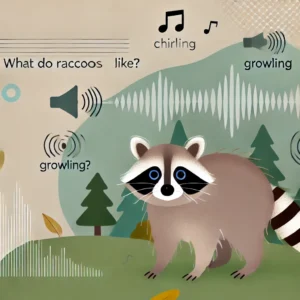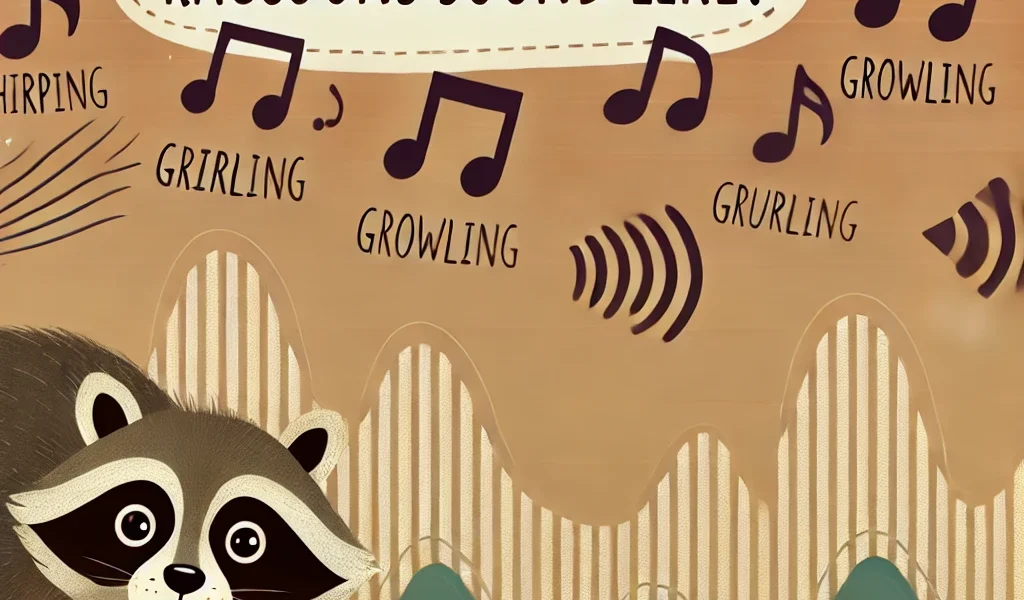What Do Raccoons Sound Like? – A Guide from Sound Academy
What Do Raccoons Sound Like? – A Guide from Sound Academy
Raccoons are fascinating creatures, not just because of their cleverness and adaptability, but also because of the variety of sounds they produce. While many people are familiar with the sight of raccoons scavenging through trash or sneaking around at night, fewer are aware of the rich array of vocalizations and noises they make to communicate with one another. In this article, we’ll delve into the various sounds raccoons produce, their meanings, and how understanding these sounds can help you better interpret raccoon behavior. Welcome to Sound Academy’s guide on raccoon sounds!
Raccoon Vocalizations: An Overview
Raccoons are highly vocal animals. They use a wide range of sounds to express their needs, fears, and social interactions. From growls and purrs to screeches and chirps, these vocalizations serve specific purposes in their daily lives. Raccoons are also nocturnal creatures, meaning most of these sounds are made during the night, when they’re most active.
Let’s break down the main types of sounds raccoons make and what each of them typically means.
Common Raccoon Sounds and What They Mean
- Chirping or Trilling SoundsOne of the most common sounds raccoons make, especially in social situations, is a chirping or trilling noise. This high-pitched sound is often heard between raccoon mothers and their young kits. It serves as a way for mothers to call to their babies or for kits to express hunger or distress. If you ever hear this sound near your home, it’s likely that a mother raccoon is nearby, taking care of her young.
- PurringWhile we might associate purring with cats, raccoons also purr, but the context is a bit different. Raccoons purr when they feel content, such as after eating or when resting in a safe, secure spot. If a raccoon feels safe and relaxed, you may hear this soft, low sound. In some cases, young raccoons also purr when snuggling up to their mother.
- Growling and HissingRaccoons are territorial creatures, and when they feel threatened, they will growl or hiss to scare away potential dangers. These sounds are low, guttural, and aggressive. If you hear a raccoon growling or hissing, it’s a clear sign that the animal feels threatened and is ready to defend itself. This is most commonly heard when raccoons encounter predators or even humans who get too close for comfort.
- ScreechingAnother sound that might catch you off guard is a loud, sharp screech. Raccoons make this noise when they’re either frightened or in physical danger. A screech is a raccoon’s way of signaling distress to other raccoons or potential predators. You might hear this sound during territorial disputes between male raccoons or when a raccoon is injured.
- ChatteringRaccoons also produce a chattering sound, often made when they’re agitated or excited. This sound can range from a soft clicking noise to a rapid series of chattering syllables. It’s not uncommon to hear this sound when raccoons are rummaging through garbage or exploring a new area in search of food. The chatter serves as a form of communication, alerting other raccoons to what they’re doing or how they’re feeling.
- Screaming or WailingA particularly eerie sound made by raccoons is a long, drawn-out scream or wail. This sound is typically associated with mating season, where males compete for the attention of females. The scream can be heard from quite a distance and is one of the most unsettling noises raccoons produce. However, it’s important to note that this noise, while alarming to us, is a natural part of raccoon mating behavior.
Why Raccoons Make So Many Different Sounds
Raccoons are social animals, and their wide range of vocalizations reflects the complexity of their interactions with each other. Their sounds are used for everything from establishing territories to communicating with offspring, finding mates, and warning other raccoons about potential dangers. Understanding the context of these sounds can give you a clearer picture of what’s happening in the world of raccoons around you.
 When Are Raccoon Sounds Most Common?
When Are Raccoon Sounds Most Common?
Raccoons are primarily nocturnal, so the majority of their vocalizations occur at night. You’re most likely to hear raccoons between dusk and dawn, when they’re actively foraging for food or engaging in social interactions. During the day, raccoons tend to stay hidden in dens, and their sounds become far less frequent.
Mating season, typically between January and June, is another time when raccoon sounds increase in frequency. During this time, males make more aggressive vocalizations, such as growls, hisses, and screams, to establish dominance and compete for females.
How to Respond to Raccoon Sounds
Hearing raccoons near your home can be a bit startling, especially if you’re unfamiliar with the noises they make. However, it’s important to remember that most raccoon sounds are part of their natural behavior and don’t necessarily indicate danger. Here are some tips for responding to raccoon sounds:
- Stay Calm: Most raccoon sounds, especially screeches or growls, are not a threat to humans. These are simply part of the raccoon’s communication.
- Observe from a Distance: If you hear raccoon sounds, avoid approaching the animal. Raccoons can become defensive if they feel threatened. It’s best to observe from afar and avoid disturbing them.
- Secure Your Trash: If raccoons are frequently making noise near your home, it’s possible they’re scavenging for food. Make sure your trash is secured in tightly sealed bins to prevent raccoons from finding easy meals.
- Call for Professional Help: If you believe a raccoon is injured or in distress, it’s best to contact local wildlife professionals for assistance.
Raccoon Sounds in Pop Culture
Raccoon sounds have even made their way into pop culture, often being used in movies, TV shows, and games to evoke a sense of wilderness or mischief. Their chattering and purring sounds can add a layer of personality to animated characters or serve as a comical element in nature documentaries. In some cases, raccoons are portrayed as intelligent creatures who use their sounds to communicate and navigate human environments cleverly.
Conclusion
Raccoons are more than just the masked bandits of the animal kingdom; they’re vocal, social creatures with a rich repertoire of sounds that help them communicate in a variety of contexts. From chirps and purrs to growls and screeches, raccoon vocalizations are a fascinating aspect of their behavior. By understanding the meaning behind these sounds, we can better appreciate these intelligent animals and learn to coexist with them in our shared environments.
Next time you hear the chattering or screeching of a raccoon in the night, remember that it’s just part of their complex social world—and now you know a little more about what they’re saying!




